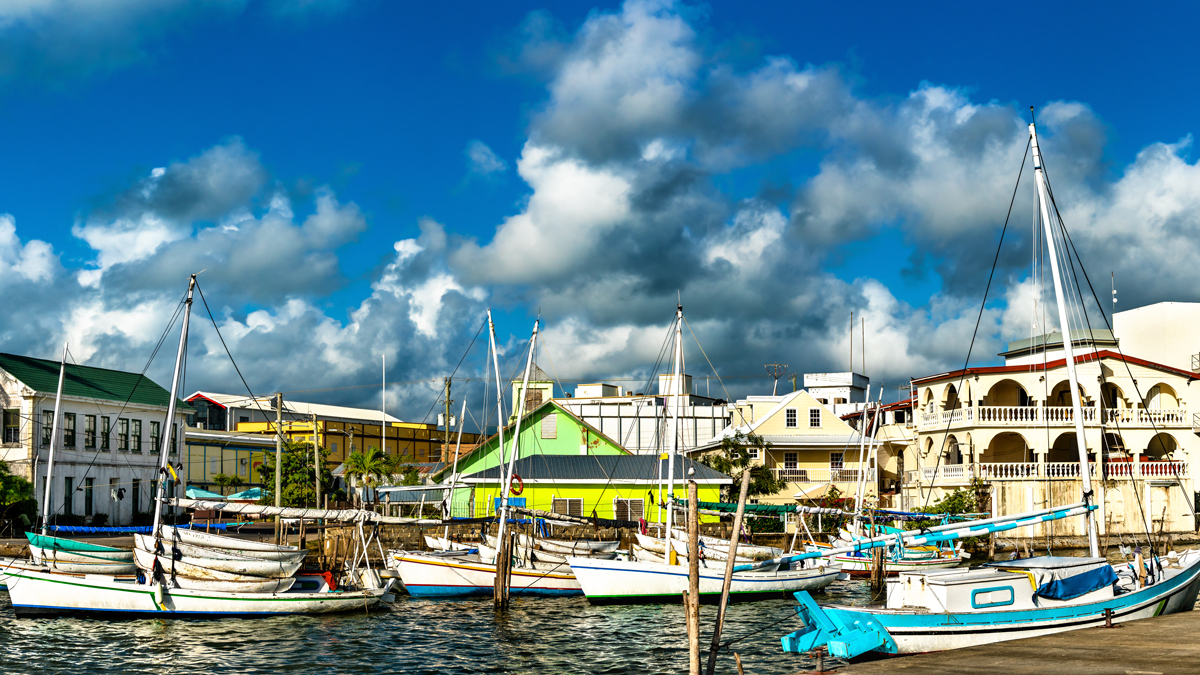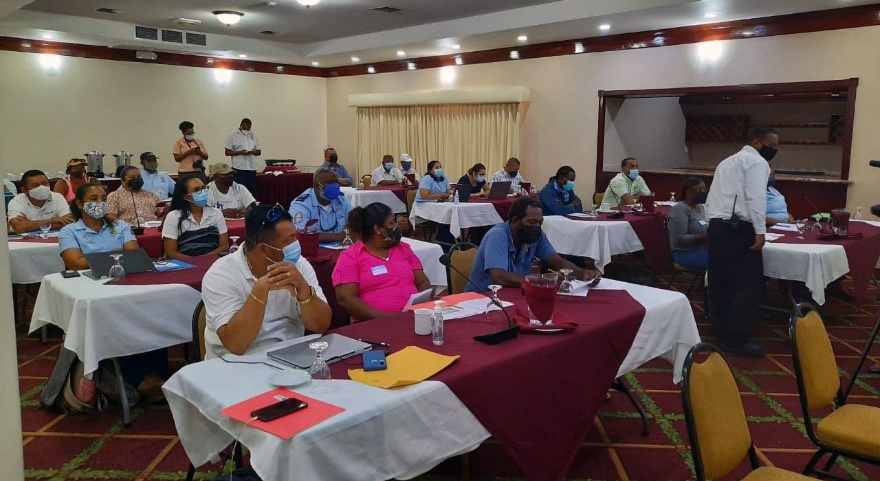From 29 June to 2 July 2021, fishery stakeholders gathered in Belize City for an Adaptive Multispecies Finfish Management Workshop co-organized by UNCTAD, DOALOS, the Belize Ministry of Blue Economy and Civil Aviation, the Belize Fisheries Department, the Directorate General for Foreign Trade of Belize (DGFT), and Environmental Defense Fund (EDF). The workshop aimed to develop multi-stakeholder capacity for participation in science-based assessment and management of finfish and to support the finalization of a national multispecies finfish management plan. Forty-seven participants attended this training, including the Oceans Economy and Trade Strategy (OETS) project partners and trainers.
Finfish fishery management is a priority for the Government of Belize, fisheries managers, scientists and fishers as (i) the sustainable use of finfish resources will alleviate pressure from heavily exploited nearshore resources such as spiny lobster and queen conch, (ii) it will contribute to the resource and trade diversification for livelihood and export opportunities, and (iii) it will help ensure optimal and sustainable use of fishery resources in the face of climate change.
Day 1 – 29 June
The first day of the workshop focused on providing national, regional, and international context for the sustainable management of Belize’s multispecies finfish fishery. Ms. Beverly Wade, Director of Blue Economy, gave inspirational opening remarks, highlighting that “participants’ support in the development and implementation of this strategic priority action for the marine finfish sector will undeniably result in the realization of an important building block in the overarching National Blue Economy Strategy, which is expected to place Belize in a position to benefit from a planned and structured approach to its ocean-based economic sector”. Additional opening remarks were offered by Mr. Richard Reid (Senior Trade Economist, DGFT), Mr. David Vivas Eugui (Legal Officer, UNCTAD), and Mr. Michele Ameri (Legal Officer, DOALOS).
A panel of presenters provided an introduction to Belize’s OETS, including the relevant governance and trade context. Mr. David Vivas Eugui presented on main trade trends, findings, opportunities and recommendations for the development of the finfish value chain. Mr. Michele Ameri presented on the legal framework reflected in UNCLOS and the UN Fish Stocks Agreement. Mr. Peter Murray of the Caribbean Regional Fisheries Mechanism (CRFM) shared a relevant example of management and value chain opportunities in the eastern Caribbean fly fish fishery.
EDF’s Nic Requena (Belize Project Manager) and Dr. Kendra Karr (Senior Scientist) shared a presentation on principles of climate-resilient fisheries and the importance of adaptive, science-based management, highlighting the role of finfish management as an important element. Workshop participants then discussed, in breakout groups, their hopes and expectations for the finfish management plan. Common themes included the need for sustainable development of the fishery, in order to generate economic and social benefits to Belizeans. Participants called for a practical and implementable plan that is inclusive in its development and implementation. There was also strong emphasis on the need for a science-based, data-driven approach.
Day 2 – 30 June
The second day of the workshop featured several training modules and knowledge transfer exercises that aimed to strengthen participants’ capacity for science-based management of multispecies finfish fisheries.
Nic Requena shared a presentation on the context for multispecies finfish management in Belize, including Belize’s experience with science-based management of conch and lobster fisheries. He highlighted the enabling conditions created by the new Fisheries Resources Act of 2020, a robust network of marine protected areas, and the nationwide Managed Access fishing rights program. Mr. Requena summarized existing knowledge of finfish in Belize to support science-based management, and participants then discussed data needs, available data/knowledge, and data gaps in breakout groups. The breakout discussions emphasized the need for national data standardization, storage, and analysis; consistent data collection; and better information sharing between fishers and fishery managers.
EDF consultant Ms. Denise Garcia then facilitated an interactive fishing game in which workshop participants simulated the dynamics in a multispecies finfish fishery. The game highlighted the importance of strong science-based management and the need for an adaptive approach as fishery conditions change, especially in the face of climate change.
Mr. Ramon Carcamo, a consultant for UNCTAD and DOALOS, presented an overview and initial results from a 6-month pilot project to collect finfish data from the Conch Shell Bay Fish Market in Belize City. The data collection exercise, implemented in the context of OETS project, aims to identify and quantify the species landed, identify the types and quantity of gears used, estimate fishing effort, and estimate the age structure of the fished species. The project serves as a model for a data collection protocol that can contribute key data for finfish management decisions.
In the final training module of the day, Dr. Kendra Karr provided an overview of the Adaptive Management Framework (AMF) for Belize. Dr. Karr explained the participatory decision- making framework that provides the foundation for the finish management plan, including goal setting, data collection and analysis, and determination of harvest controls. Workshop participants then worked in groups to review the AMF application in Belize’s spiny lobster fishery and to practice key steps of the AMF for finfish.
Day 2 concluded with a rich discussion of indicators of fishery performance and additional data needs, including the need to collect more socioeconomic data.
Day 3 – July 1
The third day of the workshop included the final training modules and then presentation and discussion of the draft finfish fishery management plan.
Dr. Karr shared a presentation on the “fish baskets” approach to multispecies finfish management, in which species are grouped into “baskets” for management. She presented draft fish baskets that were developed by a group of stakeholders in March 2020, and workshop participants recommended updates and modifications to the baskets. The consultations resulted in broad support from workshop participants for this key element of the management plan.
In the next training module, Dr. Karr presented an overview of the fisheries goal setting and decision-making process, emphasizing how to set and adjust harvest controls to manage fishing pressure. Participants reviewed the decision-making approach using the Belize spiny lobster fishery as an example, and then practiced applying it to the finfish fishery through a scenario-based breakout activity. Participants then shared feedback on the harvest control measures for each of the fish baskets, emphasizing the importance of practical and effective measures for each.
The final session of Day 3 was the start of a focused discussion on the draft finfish management plan covering priority topics for stakeholder input and feedback. Remarks from Mr. Rigoberto Quintana (Acting Fisheries Administrator, BFD), Mr. Vivas, Mr. Ameri, and Ms. Sarah Poon (EDF) celebrated the feedback stakeholders provided in previous sessions, provided additional context for the importance and impact of the finfish management plan, and encouraged continued dialogue within and beyond the workshop. Mr. Quintana shared the next steps that would follow the workshop, including review by the Fisheries Council and a public stakeholder consultation process.
Ms. Denise Garcia then gave a broad overview of the draft management plan’s contents and participants engaged in further discussion of topics including the fish baskets, fishery performance indicators, harvest control measures, enforcement, and data collection/management.
Day 4 – July 2
The final day of the workshop focused primarily on gathering additional input on elements of the management plan, continuing the discussion from Day 3. Feedback was noted by workshop facilitators to inform management plan revisions.
Participants completed workshop evaluations and then received workshop certificates acknowledging their participation and contributions. Mr. Quintana, Mr. Vivas, Mr. Ameri and Ms. Poon gave closing remarks on behalf of the workshop organizers and thanked participants for their enthusiastic engagement in trainings and discussions.
Next steps
Following the workshop, EDF and the Belize Fisheries Department updated the draft management plan to incorporate feedback from workshop participants. The draft will next be reviewed by Belize’s newly inaugurated Fisheries Council and then go through a two-month public consultation process to gather additional stakeholder input and feedback. The consultation process, a required step under the Fisheries Resources Act of 2020, will ensure broad stakeholder feedback on the management plan before it is adopted and implemented.
The participants, representing multiple stakeholder groups, learn fundamentals of science-based, adaptive fisheries management. Photo credit: Nic Requena, 2021.
The Adaptive Multispecies Finfish Management Workshop is an activity of phase II under the United Nations Development Account funded project entitled “Supporting Developing Countries in analyzing and implementing evidence-based and policy coherent oceans economy and trade strategies (OETS)”. The project aims at strengthening capacities of selected coastal developing countries, such as Belize, in elaborating, adopting and implementing evidence-based and policy coherent Oceans Economy and Trade Strategies. These strategies will promote sustainable trade of products and services in ocean-based economic sectors within the UNCLOS framework. The OETS project is being implemented by UNCTAD and DOALOS.
Belize is presently in the implementation phase of its OETS and decided to implement the priority actions that support the sustainable development and monitoring of the multispecies finfish fishery. These actions will support Belize’s goal to ensure resilient marine ecosystems and fishery-dependent communities through the development and implementation of a national science-based Adaptive Multispecies Finfish Fishery Management Plan. It will also support the development of the finfish value chain and bring opportunities for resource and trade diversification for local coastal livelihoods.
The finfish training workshop will be held from 29 June to 2 July 2021, with the aim of developing multi-stakeholder capacity for participation in science-based assessment and management of finfish and to support the finalization of a national multispecies finfish management plan. Training sessions will emphasize climate-resilient fisheries; data collection and adaptive, science-based management approaches; multispecies finfish management, including but not limited to deep water slope fish species; and relevant international and regional fisheries management regimes. There will also be sessions dedicated to gathering input and feedback on a draft national finfish management plan.


